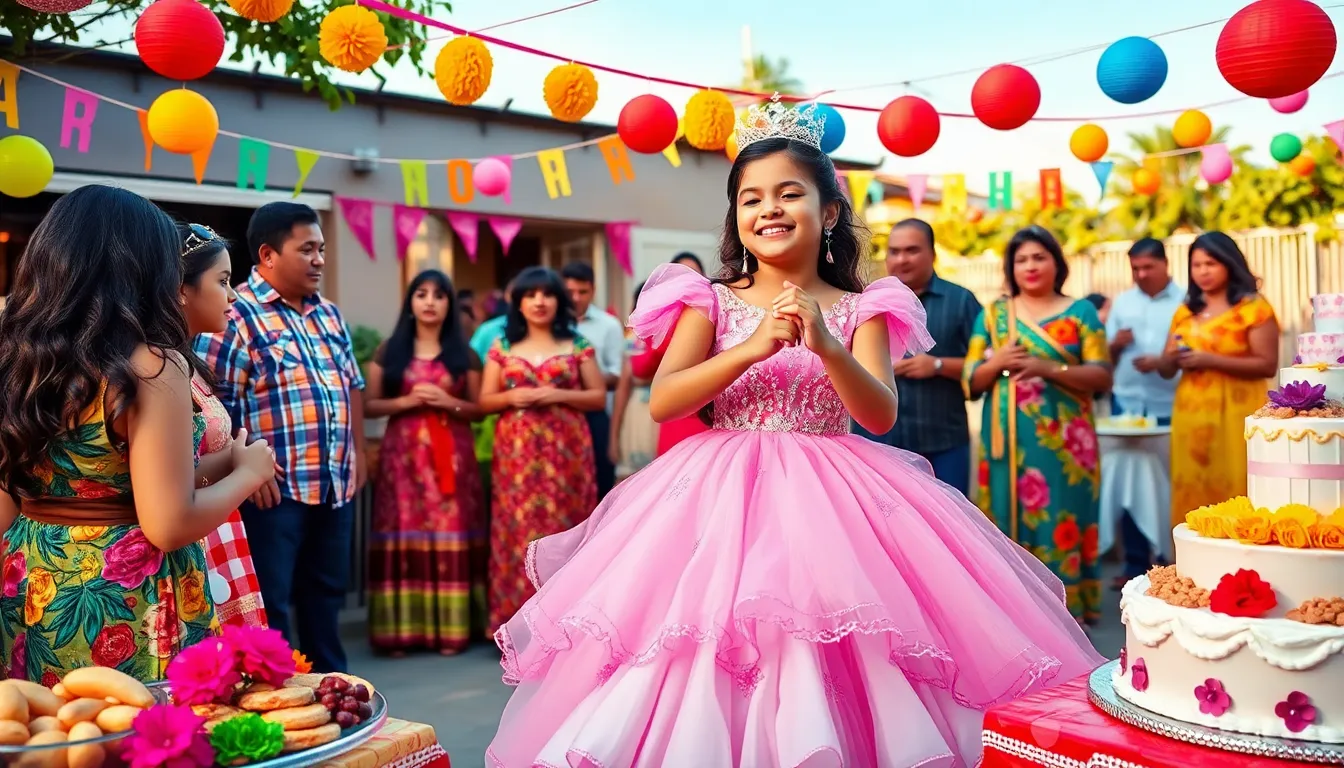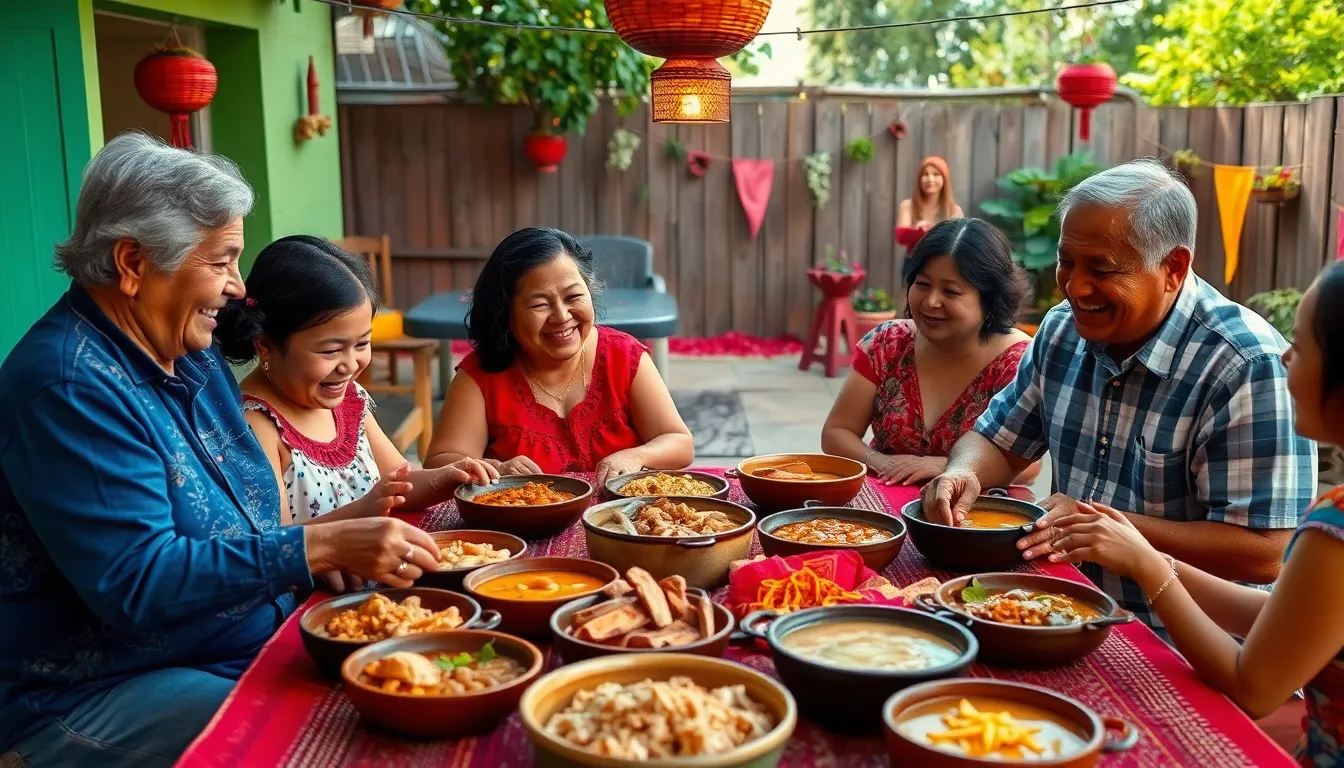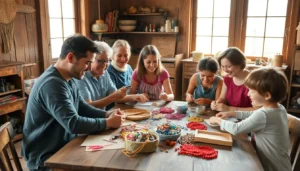Table of Contents
ToggleMexican family traditions are like a vibrant piñata filled with colorful surprises, waiting to be discovered. From lively fiestas to mouthwatering feasts, these customs weave together a rich tapestry of love, laughter, and a sprinkle of chaos. Imagine a Sunday gathering where the aroma of tamales fills the air and the sound of laughter echoes through the house. It’s not just a meal; it’s an experience that binds generations together.
These traditions aren’t just about food and festivities; they’re about connection. They teach values, celebrate heritage, and remind everyone that family is everything—even if Uncle Jorge insists on telling the same embarrassing story for the hundredth time. Dive into the heart of Mexican culture, where every tradition tells a story and every gathering is an invitation to create lasting memories.
Overview of Mexican Family Traditions
Mexican family traditions play a vital role in shaping cultural identity. These customs strengthen bonds and create lasting memories.
Importance of Family in Mexican Culture
Family forms the heart of Mexican culture. They provide support during challenging times and celebrate achievements together. Individuals often prioritize family gatherings, especially during holidays. Events such as birthdays and Día de Muertos showcase family unity. Community involvement enhances these experiences, as extended family and friends come together. Values passed down through generations emphasize respect, love, and loyalty, highlighting the role of family as a cornerstone of Mexican life.
Generational Bonds
Generational bonds reflect the richness of Mexican family traditions. Elders hold esteemed roles, boasting wisdom and life lessons. Respecting these family members fosters deeper connections across ages. Rituals passed down influence shared values, traditions, and culinary skills that unite families. Celebrations involve all ages, creating a vibrant mix of youth and tradition. Storytelling from grandparents enriches this familial tapestry, ensuring stories and teachings persist. Through these interactions, families cultivate a strong sense of belonging and identity that thrives in a modern world.
Key Mexican Family Celebrations

These celebrations highlight the essence of Mexican family traditions, showcasing vibrant customs that strengthen bonds and honor heritage.
Quinceañera
Quinceañera marks a young girl’s transition into womanhood, celebrated at age 15. This event involves a religious ceremony followed by a grand fiesta. Families invest significant time and resources into planning the celebration, reflecting cultural values. Guests witness dances, including the traditional waltz, and enjoy elaborate meals. Symbolic elements, like the tiara and the last doll, convey important cultural messages about adulthood and responsibility. Celebrations often involve music, heartfelt speeches, and decades-long family traditions, enhancing collective memories amongst relatives.
Día de los Muertos
Día de los Muertos honors deceased loved ones, merging Indigenous customs and Catholic influences. Families create altars, called ofrendas, adorned with photographs, candles, and favorite foods of the departed. Communities come together for parades filled with colorful costumes and intricate face makeup. This celebration fosters reflection on life, death, and legacy, reinforcing connections with those who have passed. Additionally, families share stories and memories, enriching the experience and teaching younger generations about their heritage. The holiday emphasizes joy and remembrance, creating a unique communal bond.
Christmas Traditions
Christmas in Mexican culture features vibrant traditions, blending religious observances with festive gatherings. Families participate in Las Posadas, reenacting Mary and Joseph’s search for shelter, which lasts nine nights leading to Christmas Eve. On “Nochebuena,” families celebrate with midnight feasts that highlight traditional dishes like tamales and bacalao. Piñatas often appear at gatherings, engaging children in joyful activities. Attending Mass on Christmas Eve adds a spiritual dimension, reflecting values of faith and togetherness. These customs strengthen family ties, ensuring the spirit of Christmas resonates across generations.
Traditional Family Values
Traditional family values drive Mexican culture. These values prioritize respect, unity, and support within families.
Respect and Honor
Respect and honor play a pivotal role in Mexican families. Elders command reverence for their wisdom and life experiences. Children learn to value their elders through actions like seeking advice or listening to stories. Honoring family traditions fosters connections and maintains a sense of identity. Formal shows of respect, such as greetings and expressions of gratitude, further reinforce these values. Celebrations acknowledge the contributions of family members, promoting a culture of gratitude. Such practices ensure that respect transcends generations, solidifying family bonds.
Unity and Support
Unity and support define the family structure in Mexican culture. Families gather to celebrate milestones like birthdays, weddings, and religious events, emphasizing togetherness. They provide emotional backing during difficult times, ensuring no one faces challenges alone. This commitment to unity develops strong bonds and a sense of belonging. Regular family gatherings reinforce these connections, creating an environment of mutual support and encouragement. Community involvement enhances shared experiences, allowing families to work together seamlessly and strengthen ties. Through consistent support, families cultivate resilience and a shared identity, which thrives despite life’s challenges.
Role of Food in Mexican Family Traditions
Food serves as a central element in Mexican family traditions, reinforcing bonds across generations. Families gather around the dining table, sharing not only meals but also stories and laughter. Meals often transform ordinary gatherings into vibrant celebrations where everyone participates. Extended family members contribute to the feast, bringing their specialties to ensure a diverse spread that reflects cultural heritage.
Family Gatherings
During family gatherings, food acts as a catalyst for connection. Traditional dishes like tamales and pozole invite everyone to partake in the creation and consumption of these cherished recipes. Meals often begin with a shared prayer or blessing, highlighting gratitude and invoking family unity. Elders pass down stories while younger members engage, fostering deep connections through shared experiences around food. Celebrations often center on favorite dishes that evoke nostalgia, creating lasting memories tied to the meals shared.
Traditional Recipes
Traditional recipes embody cultural identity within Mexican families. Recipes passed down through generations showcase regional ingredients, unique flavors, and ancestral techniques. Sopes, enchiladas, and mole not only satisfy hunger but also tell stories of heritage and community. Families often hold cooking sessions to preserve these recipes, strengthening family ties. The preparation of holiday meals, like those during Día de Muertos, becomes a collective effort that honors ancestors and celebrates their memory. Recipes serve as a bridge between the past and present, connecting family members through culinary traditions.
Mexican family traditions are a vibrant tapestry woven from love respect and shared experiences. They create a sense of belonging that transcends generations and strengthens cultural identity. These customs not only celebrate milestones but also nurture the bonds that hold families together through life’s ups and downs.
From lively fiestas to heartfelt meals the essence of family is captured in every gathering. As families continue to honor their heritage they pass down invaluable lessons and cherished memories. Embracing these traditions ensures that the spirit of togetherness remains alive enriching both present and future generations.




